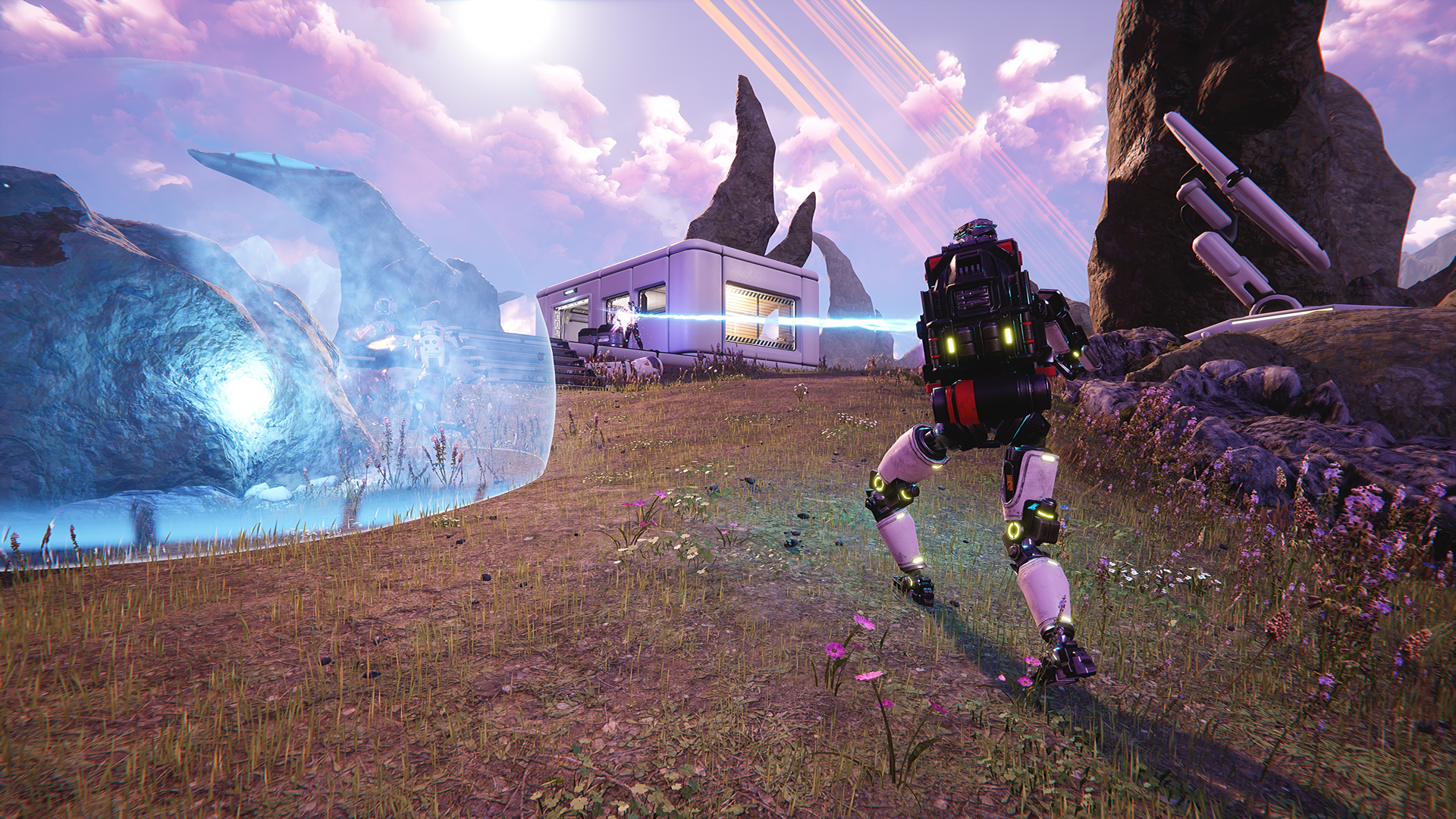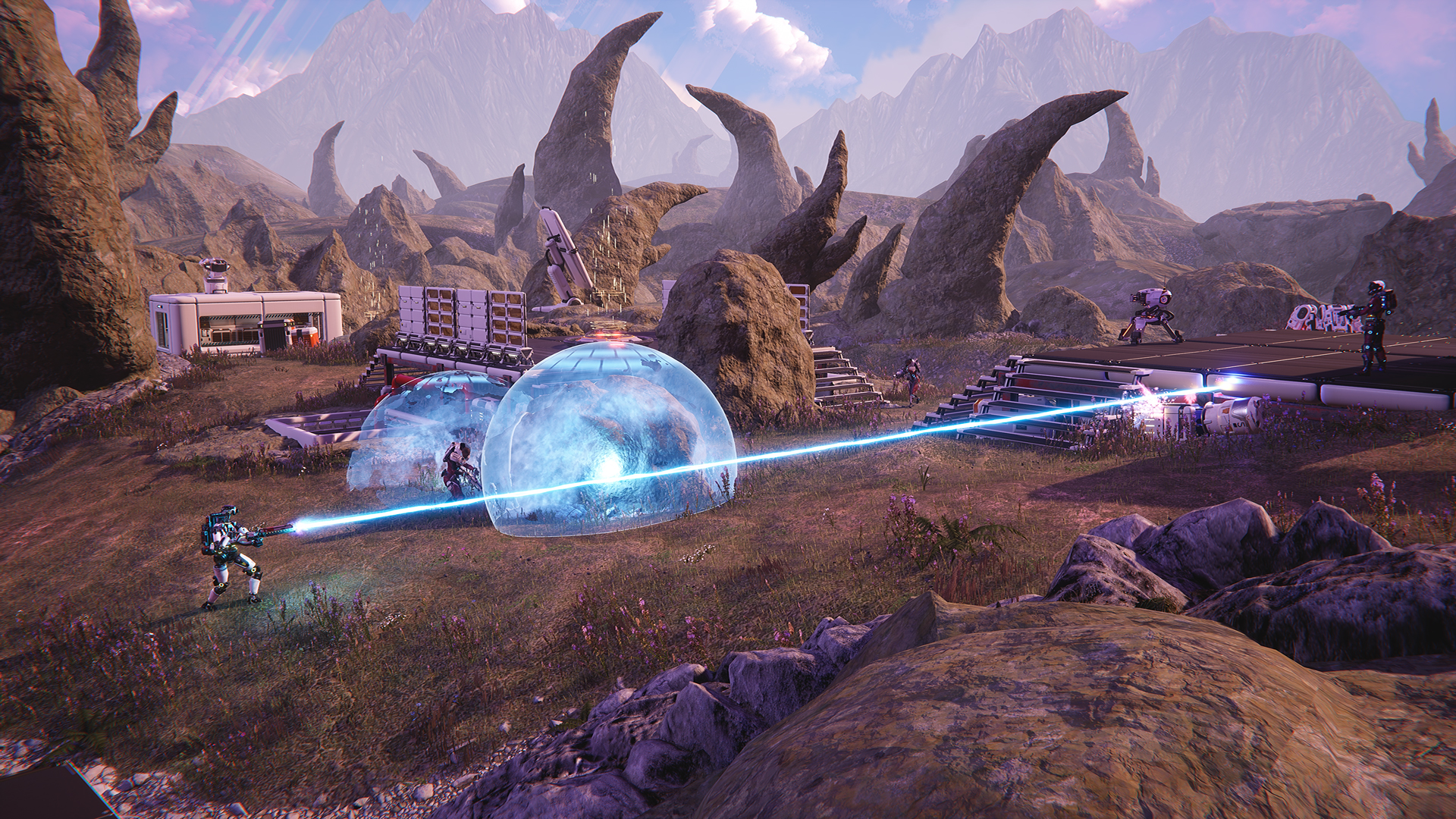
Lemnis Gate is Shooter Linguistics. It's a study in the language of first-person shooters that will put your years of experience in the field to the test, unlike anything in the genre that has come before it. The game takes place within a collection of 25-second time loops, pushing you to make fractional, tactical decisions on movement, positioning and firing, one turn at a time. Once the clock runs out on one of your five available loops, that hero's path is set in stone and your opponent is afforded the opportunity to respond. They can react to (and negate) your actions, set their own plans in motion, or – if they're good enough – do both all at once with a few careful stresses of the thumbsticks and squeeze of the triggers.
The ghosts of previous loops haunt every second of the ticking clock, giving you room to react, set up chokepoints, or otherwise cause carnage on an inter-dimensional scale. Every action has purpose here; even the death of one of your heroes or the destruction of a key objective can be reversed, should you set the right chain of events in motion. This is one wrinkle among many that help Lemnis Gate stand out from the crowd in a way that feels warranted – it's a unique idea with strong execution. It's also one of the many factors that make it such a difficult game to grasp. Truly, I wonder whether Lemnis Gate would have gotten this far through production were the industry without elements like Twitch, YouTube, and Game Pass to help sell it.
It's just a matter of time

There's plenty of plays that I could recount here, but I think this one perhaps best represents why I so quickly fell in love with Lemnis Gate. During my time with an early Xbox Series X build, I found myself facing a fifth and final loop with all of my heroes technically in place to destroy the two objectives necessary to ensure victory. The problem is, my opponent used each of their turns to immediately kill whatever hero I placed in the arena – it was an aggressive play that sought to strong-arm me out of a win. My only option was for my final hero to create enough carnage that it disrupted the final flow of play, letting at least two of my heroes escape death and continue down the path I had originally ascribed for them towards the objectives unimpeded.
I decided to hastily set up an assortment of turret traps at locations of tactical importance across the arena. I cascaded the mini-guns through areas that I knew would catch at least two enemies at once, having observed the full extent of my opponent's play on repeat before committing to dropping my hero into the field and setting the final loop in motion. The turrets activate in waves behind me, shredding my opponents' heroes as they run down their defined paths. Had my foe positioned a hero on higher ground in an earlier round, firing blindly into open space to cut off a path across the middle of the arena in future loops, my plan wouldn't have worked. But that's Lemnis Gate, a game that requires you think at least four steps ahead all while leveraging your experience with competitive shooters to cover the distance to the fifth. It was a sweep, and my new friend on the other end of the microphone was none too happy to see it play out like that.

"In a way, Lemnis Gate is almost the direct antithesis of the modern shooter"
In spite of the tempered pace that play can unfold, and the tactical approach necessitated by the central hook, Lemnis Gate is a surprisingly aggressive game. You'll find yourself willing your opponent to make themselves look the fool, cursing them openly as they unravel your smartest plays. In this way, Lemnis Gate isn't a game for people that are good at traditional first-person shooters, but rather an experience for those that truly love them. Like I said, it's Shooter Linguistics – a study of how to look like the smartest and stupidest FPS player in 25-second bursts.
In a way, Lemnis Gate is almost the direct antithesis of the modern shooter. That's a space where balancing your accuracy against recoil and time-to-kill metrics is king. Your capacity to react to emerging threats and situations is important in Lemnis Gate, but not in the way it would be in something like Call of Duty: Black Ops Cold War, Overwatch, or Titanfall 2. Hell, most of the time you'll be reacting to things that haven't even happened yet. In a way, Lemnis Gate is Counter-Strike re-envisioned as a tactical, turn-based shooter – it's certainly as punishing as Valve's infamous FPS, but certainly more open to interpretation and experimentation.
Lemnis Gate's action is methodical and punishing, which is to say that it's frequently satisfying and rewarding. There are no wah wahs about lag and ping here, or endless arguments around weapon meta – frequent discussions in any modern online shooter lobby these days. Instead, Lemnis Gate is all about positioning and tactical awareness. Your capacity to set a chain of events in motion and, more importantly, react accordingly when it falls apart in front of your eyes in the space of 25 seconds. Ultimately, no matter what you or your opponent does in Lemnis Gate, every game ends the same way: both of you will have five heroes apiece running routines that you just spend minutes plotting and recording, and all you can do is sit back, watch on, and hope that you're a smarter shooter than your opponent.
Weekly digests, tales from the communities you love, and more
Lemnis Gate is set to launch August 3, 2021. It'll be available on PC, PS4, PS5, Xbox One, Xbox Series X, and via Xbox Game Pass.

Josh West is the Editor-in-Chief of GamesRadar+. He has over 15 years experience in online and print journalism, and holds a BA (Hons) in Journalism and Feature Writing. Prior to starting his current position, Josh has served as GR+'s Features Editor and Deputy Editor of games™ magazine, and has freelanced for numerous publications including 3D Artist, Edge magazine, iCreate, Metal Hammer, Play, Retro Gamer, and SFX. Additionally, he has appeared on the BBC and ITV to provide expert comment, written for Scholastic books, edited a book for Hachette, and worked as the Assistant Producer of the Future Games Show. In his spare time, Josh likes to play bass guitar and video games. Years ago, he was in a few movies and TV shows that you've definitely seen but will never be able to spot him in.


